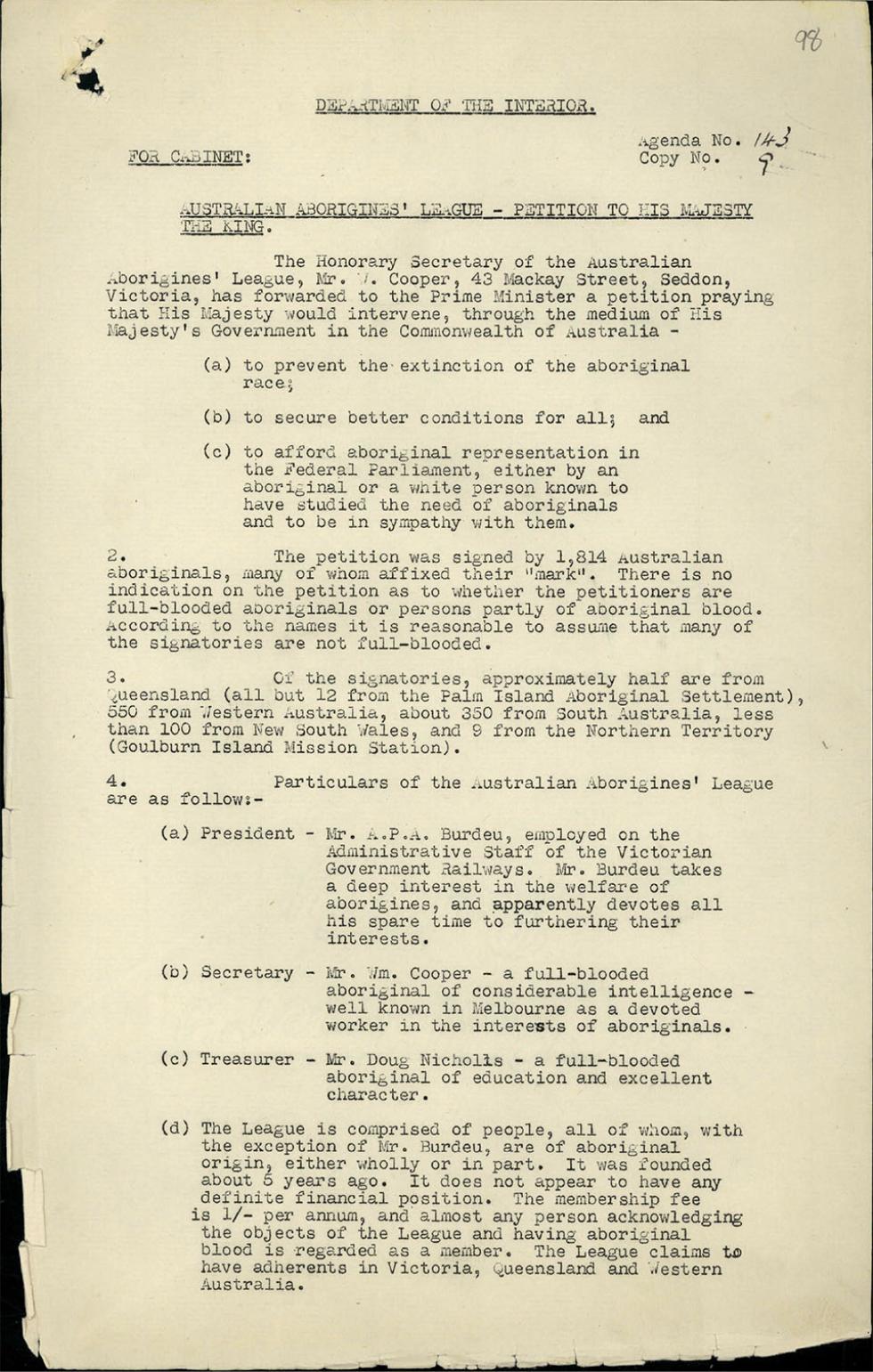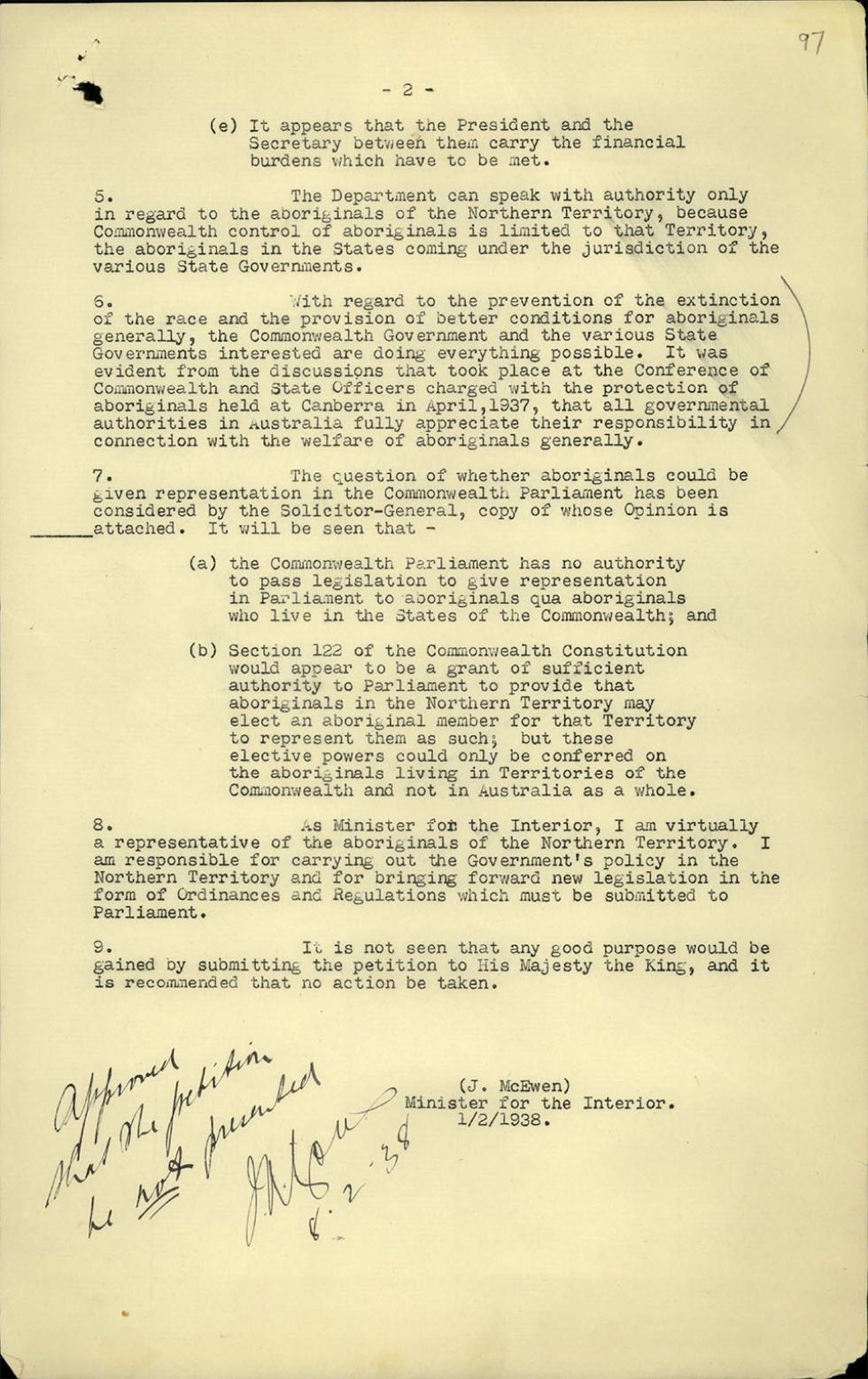

Aboriginal and Torres Strait Islander people should be aware that the National Archives' website and collection contain the names, images and voices of people who have died.
Some records include terms and views that are not appropriate today. They reflect the period in which they were created and are not the views of the National Archives.



[Capitalised and underlined heading reads:] DEPARTMENT OF THE INTERIOR.
Agenda No. [Number] 143
Copy No. [Number] 9
[Capitalised and underlined title reads:] FOR CABINET:
AUSTRALIAN ABORIGINES' LEAGUE – PETITION TO HIS MAJESTY THE KING.
The Honorary Secretary of the Australian Aborigines' League, Mr. [Mister] W. [William] Cooper, 43 Mackay Street, Seddon, Victoria, has forwarded to the Prime Minister a petition praying that His Majesty would intervene, through the medium of His Majesty's Government in the Commonwealth of Australia –
2. The petition was signed by 1,814 Australian aboriginals, many of whom affixed their "mark". There is no indication on the petition as to whether the petitioners are full-blooded aboriginals or persons partly of aboriginal blood. According to the names it is reasonable to assume that many of the signatories are not full-blooded.
3. Of the signatories, approximately half are from Queensland (all but 12 from the Palm Island Aboriginal Settlement), 550 from Western Australia, about 350 from South Australia, less than 100 from New South Wales, and 9 from the Northern Territory (Goulburn Island Mission Station).
4. Particulars of the Australian Aborigines' League are as follow [sic]: –
– [Page] 2 –
5. The Department can speak with authority only in regard to the aboriginals of the Northern Territory, because Commonwealth control of aboriginals is limited to that Territory, the aboriginals in the States coming under the jurisdiction of the various State Governments.
6. With regard to the prevention of the extinction of the race and the provision of better conditions for aboriginals generally, the Commonwealth Government and the various State Governments interested are doing everything possible. It was evident from the discussions that took place at the Conference of Commonwealth and State Officers charged with the protection of aboriginals held at Canberra in April, 1937, that all governmental authorities in Australia fully appreciate their responsibility in connection with the welfare of aboriginals generally.
7. The question of whether aboriginals should be given representation in the Commonwealth Parliament has been considered by the Solicitor -General, copy of whose Opinion is attached. It will be seen that –
a) the Commonwealth Parliament has no authority to pass legislation to give representation in Parliament to aboriginals qua aboriginals who live in the States of the Commonwealth; and
b) Section 122 of the Commonwealth Constitution would appear to be a grant of sufficient authority to Parliament to provide that aboriginals in the Northern Territory may elect an aboriginal member for that Territory to represent them as such; but these elective powers could only be conferred on the aboriginals living in Territories of the Commonwealth and not in Australia as a whole.
8. As Minister for the Interior, I am virtually a representative of the aboriginals of the Northern Territory. I am responsible for carrying out the Government's policy in the Northern Territory and for bringing forward new legislation in the form of Ordinances and Regulations which must be submitted to Parliament.
9. It is not seen that any good purpose would be gained by submitting the petition to His Majesty the King, and it is recommended that no action be taken.
(J. McEwen)
Minister for the Interior
1/2/1938.
[At the bottom of the page is a handwritten note that reads]
Approved that the petition be not presented – (singed) J. Lyons
8.2.38
This is a cabinet paper created by the Australian government to describe a petition it received from Yorta Yorta man William Cooper.
William Cooper was a political activist and community leader. He spent his life lobbying state and territory governments on behalf of First Nations people. Cooper was the founding secretary of a lobby group called the Australian Aborigines League.
On behalf of the Australian Aborigines League, William Cooper sent the Prime Minister of Australia a petition for the attention of King George VI. A petition is a written request for change, addressed to someone in authority – in this case, the King of England – and signed by a number of people.
According to this cabinet paper, Cooper’s petition asked the king to intervene in Australia ‘to prevent the extinction of the aboriginal race; to secure better living conditions for all; and to afford aboriginal representation in parliament.’
William Cooper travelled Australia for several years collecting signatures and thumb prints for his petition. Over 1,800 First Nations people from across Australia gave the petition their support.
The Australian Cabinet reviewed the petition to decide whether they would pass it on to the King. Because the federal parliament did not have the power to make a law for Aboriginal representation in parliament under the Constitution, they decided that ‘no good purpose would be gained by submitting the petition to his Majesty the King’. They recommended that ‘no action be taken.’
The original petition, including 1,814 signatures from First Nations people, was lost by the Australian government. This cabinet paper describing the petition is the only archival record we have of this significant work of activism.
The petition’s call for Aboriginal representation in Parliament is still relevant. In 2017, the Uluru Statement from the Heart called for Constitutional reforms in Australia, including that a First Nations voice be enshrined in the Constitution. In a referendum held on 14 October 2023 the Australian people voted against the establishment of an Aboriginal and Torres Strait Islander Voice.
William Cooper’s petition is one example of the decades of First Nations activism that leads to the Uluru Statement’s call for Voice, Treaty and Truth.
Learn how to interpret primary sources, use our collection and more.
